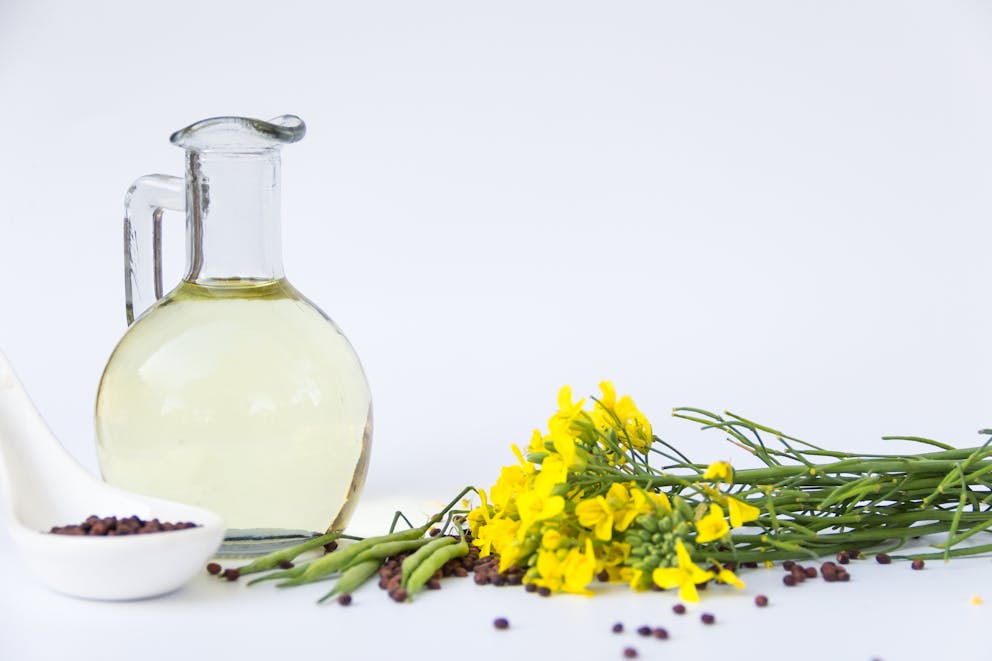The #1 Worst Food for Your Heart (HINT: It's Not Sugar)
The #1 Worst Food for Your Heart (HINT: It's Not Sugar)
Seed oils have quietly infiltrated our kitchens and diets, but at what cost to heart health? Let's dive into the surge of seed oil consumption over recent years and its not-so-heart-friendly consequences.
You'll get a clear view of how these oils alter cholesterol levels for the worse and stir up inflammation in arteries.
We'll also highlight their hidden presence in everyday foods and debunk some misleading studies that paint them in an innocent light.
Beyond just heart issues, we explore how they play a role in metabolic syndrome and cause damage across other body systems through lipid peroxidation.
This article aims to teach you how to make healthier choices for your heart by unpacking the complex journey from bottle to the bloodstream.
The Rise of Seed Oil and Its Impact on Heart Health
Imagine your kitchen pantry as a trove, not of treasures but hidden villains in the form of seed oils. These oils have snuck into our diets over decades, replacing traditional fats like butter and lard.
Why does this matter? Because the dramatic increase in seed oil consumption correlates strongly with rising heart disease rates.
Recent studies point to how these oils—packed with omega-6 fatty acids—throw off our body's essential fatty acid balance. This imbalance can lead to inflammation, a key player in heart disease.
This isn't just about avoiding fried foods at your local diner; it's deeper than that. The prevalence of seed oils in processed foods means they're everywhere—from salad dressings to baked goods.
Identifying them on ingredient labels is the first step towards protecting your heart health.
Understanding the Biochemical Effects of Seed Oils
Delving into how seed oils modify LDL cholesterol and their inflammatory effects on the arteries.
The Modification of LDL Cholesterol
An overview of how seed oils alter LDL cholesterol, enhancing its harmful effects. Seed oils have a knack for tweaking LDL cholesterol, turning it into a more menacing form. This altered LDL is more prone to sticking to your artery walls, setting the stage for heart disease.
A study highlighted by PubMed explains how this process accelerates arterial plaque buildup. But why does this matter? Well, imagine your arteries as highways. The smoother they are, the better traffic flows.
Now think of modified LDL as roadblocks that slow everything down and cause jams - not something you want in your body's highways.
Inflammation and Arterial Damage
Examining the link between seed oil consumption and arterial inflammation.
Eating seed oils can be like sending an open invitation to inflammation within your arteries. Chronic inflammation doesn't just irritate; it damages the artery walls over time, making them vulnerable to diseases.
This relentless assault on your arteries isn't trivial—it's linked with severe conditions beyond heart disease itself.
For those wanting a deeper dive into these mechanisms, research available through ScienceDirect offers comprehensive insights into how dietary fats influence inflammation levels.
The Hidden Dangers in Your Kitchen
Imagine opening your pantry or fridge only to find that some of the most common items are undercover culprits contributing to heart health issues. Yes, we're talking about seed oils hiding in plain sight.
Ultra-processed foods and Seed Oils
First off, ultra-processed foods are a significant source of harmful seed oils. These products often boast long shelf lives thanks to these oils, but at a cost to your health. A peek into ingredient lists on packages like chips or frozen meals can reveal this hidden danger.
To sidestep these unhealthy fats, opt for whole foods instead. Fruits, vegetables, and lean meats don't have hidden seed oil baggage.
Salad Dressings and Cooking Oils
Then there's the salad dressing aisle—another minefield. Many dressings are loaded with seed oils despite their healthy aura. Making your dressing at home with olive oil can be a safer bet.
Similarly, many restaurants use cheap seed oils for cooking because they’re cheaper than healthier alternatives like coconut or avocado. Asking about the cooking oil used when dining out is another step towards avoiding these dangerous fats.
The Controversy Surrounding Seed Oil Research

Debunking Misleading Studies
Picture this: A world where every study on seed oils paints them as heart-healthy heroes. But wait a minute. Digging deeper, we find that not all research is created equal. Some studies suggesting seed oils are safe have significant limitations.
For instance, many of these studies use short-term markers to assess health impacts, ignoring long-term consequences. Also, they often fail to account for participants' overall diet quality or genetic factors.
This oversight can skew results and paint an inaccurately rosy picture of seed oil's effects on heart health.
To get the full scoop on how misleading some of these claims can be, check out PubMed, where thorough reviews challenge the narrative by highlighting flaws in widely cited research.
Seed Oils' Role in Metabolic Syndrome and Heart Disease
Imagine your body as a well-oiled machine—except the oil you're using is causing more harm than good. That's the case with seed oils and their connection to metabolic syndrome and heart disease.
Seed oils, often found lurking in processed foods, can kickstart inflammation, a key player on the path to heart troubles.
Metabolic Syndrome Explained
Metabolic syndrome isn't just one condition but a cluster of them—including high blood pressure, excess body fat around the waist, high blood sugar levels, and abnormal cholesterol levels—that together raise your risk for heart disease.
The shocking part? It's linked directly to what we eat.
The diet-heart hypothesis has evolved significantly, highlighting how our dietary choices impact our health beyond simple calorie counting.
The Path from Inflammation to Heart Disease
Inflammation caused by chronic consumption of seed oils can fuel an already simmering fire within our arteries. This speeds up plaque formation and makes existing plaques unstable—a recipe for potential cardiac events.
A closer look at how inflammatory these oils activate pathways reveals startling insights into their harmful effects on cardiovascular health.
Beyond Heart Health - The Wider Effects of Seed Oils

Lipid Peroxidation and Tissue Damage
When seed oils go rogue in the body, they kickstart a process known as lipid peroxidation. This isn't just a fancy term for scientists to throw around at parties. It's a destructive reaction where free radicals attack fats in our cell membranes, leading to damaged cells.
This cellular demolition derby doesn’t stop making your tissues say, “Ouch.” It goes further, contributing to severe conditions like liver disease and even speeding up the aging process.
Imagine your cells are rubber bands; lipid peroxidation is like sunlight beating down on them until they lose their stretchiness and break.
The industrial processing of these oils only adds insult to injury by stripping away natural antioxidants that could have fought against this oxidative stress. Check out the industrial journey from seed to oil for an eye-opening look into how this happens.
Conclusion
Seed oils have crept into our diets, but now we know the dangers of seed oil for heart health. You've seen how these oils mess with cholesterol and kickstart artery inflammation.
They hide in everyday foods, fooling many. We've busted myths claiming they're safe, illuminating their actual effects.
Avoid them to protect your heart. Remember: every choice matters when it comes to what you eat.
From salad dressings to frying pans, make more brilliant picks. It's not just about heart health; it's about avoiding systemic damage caused by lipid peroxidation.
This journey from bottle to bloodstream doesn't have to end badly. With this knowledge, you can make choices that keep your heart beating strong and healthy.
Supporting Data
Previous blog
17 Signs Your Body Needs More Nutrients: Use SuperfoodsNext blog
Rid Throat and Sinus Mucus with SALT
Popular
08/21/2024
54.3K views
02/23/2025
45.8K views
11/18/2024
273.7K views
03/18/2024
11/21/2022




